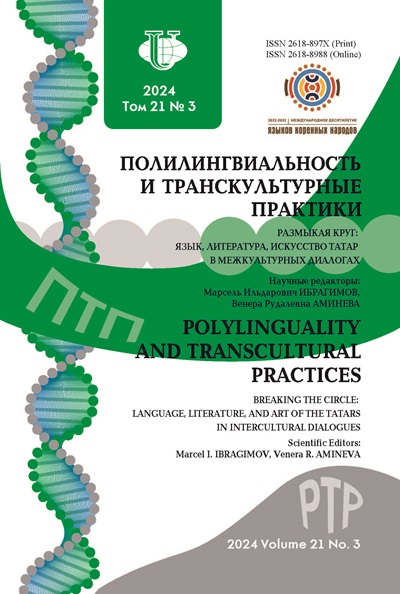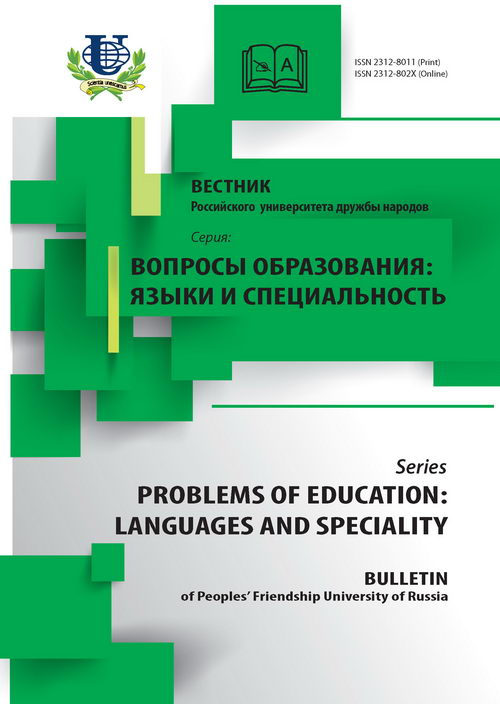№ 4 (2008)
Статьи
 5-9
5-9


 10-15
10-15


НАЦИОНАЛЬНАЯ СЕТЬ БОЛГАРСКИХ БАЗОВЫХ ШКОЛ С ИЗУЧЕНИЕМ РУССКОГО ЯЗЫКА КАК СОВРЕМЕННАЯ ОБРАЗОВАТЕЛЬНАЯ ТЕХНОЛОГИЯ
Аннотация
Национальная сеть болгарских базовых школ с изучением русского языка создана в 2003 году с целью повышения качества обучения русскому языку как иностранному. Она состоит из сорока пяти образовательных заведений (39 средних и 6 высших школ/университетов), которые расположены на территории всех административных областей Болгарии и объединены в эффективно работающую систему. Базовые школы выполняют функции информационных и методических центров, поддерживающих обучение русскому языку на национальном уровне.
Полилингвиальность и транскультурные практики. 2008;(4):16-19
 16-19
16-19


ЭВРИСТИЧЕСКИЕ МЕТОДЫ ОБУЧЕНИЯ КАК ОСНОВА ПЕДАГОГИЧЕСКОЙ ИННОВАТИКИ
Аннотация
В статье обозначены научно-педагогические проблемы классификации и модернизации эвристических методов обучения. Обосновывается необходимость внедрения в педагогическую практику сократического исследовательского диалога.
Полилингвиальность и транскультурные практики. 2008;(4):20-23
 20-23
20-23


 24-27
24-27


ВИРТУАЛЬНАЯ ЯЗЫКОВАЯ СРЕДА ОБУЧЕНИЯ «РУССКИЙ ЯЗЫК ДИСТАНЦИОННО (ПО МАТЕРИАЛАМ СМИ)»: СТРУКТУРА И СОДЕРЖАНИЕ УЧЕБНОГО КОНТЕНТА
Аннотация
В статье описывается структура и содержание виртуальной среды обучения русскому языку иностранных учащихся «Русский язык - дистанционно (по материалам СМИ)», разработанной на базе авторской сетевой программной оболочки «Dist-learn», позволяющей создавать и размещать в сети учебные материалы, оперативно вносить изменения в учебный контент, вести учет результатов обучения, организовывать дистанционное управление процессом обучения, организовывать учебную электронную коммуникацию в форме телеконференции.
Полилингвиальность и транскультурные практики. 2008;(4):28-31
 28-31
28-31


КОММУНИКАТИВНО-ФУНКЦИОНАЛЬНАЯ ПРАГМАТИКА ПЕРЕВОДЧЕСКОЙ ДЕЯТЕЛЬНОСТИ В СФЕРЕ ПРОФЕССИОНАЛЬНОГО ОБЩЕНИЯ
Аннотация
Рассматривается понятие «перевод», анализируются виды опосредованной лингвокультурной коммуникации, предлагается классификация видов перевода в сфере профессионального общения на основе коммуникативно-функционального критерия.
Полилингвиальность и транскультурные практики. 2008;(4):32-35
 32-35
32-35


НОВЫЕ ФОРМЫ САМОКОНТРОЛЯ В СИСТЕМЕ ОПРЕДЕЛЕНИЯ УРОВНЯ ВЛАДЕНИЯ РУССКИМ ЯЗЫКОМ КАК ИНОСТРАННЫМ
Аннотация
В статье представлен обзор точек зрения ученых-методистов на истоки и пути становления самоконтроля. Особое внимание обращено на качественно новые формы самоконтроля, возникшие в связи с развитием как общеевропейской, так и российской системы тестирования.
Полилингвиальность и транскультурные практики. 2008;(4):36-38
 36-38
36-38


ПРИОРИТЕТНЫЙ НАЦИОНАЛЬНЫЙ ПРОЕКТ «ОБРАЗОВАНИЕ»: ОБУЧЕНИЕ ЭФФЕКТИВНОМУ ДЕЛОВОМУ ОБЩЕНИЮ В ПОЛИКУЛЬТУРНОЙ СРЕДЕ
Аннотация
В статье рассматриваются особенности межкультурной деловой коммуникации, обусловленные несовпадением преобладающих типов активности личности в разных культурах, стереотипными представлениями носителей одной национальной культуры о представителях другой, несовпадением языковых картин мира, специфическими для России традициями делового общения.
Полилингвиальность и транскультурные практики. 2008;(4):39-44
 39-44
39-44


ФОРМИРОВАНИЕ МЕЖКУЛЬТУРНОЙ КОММУНИКАЦИИ У ИНОСТРАННЫХ СТУДЕНТОВ-ФИЛОЛОГОВ ВКЛЮЧЕННОЙ ФОРМЫ ОБУЧЕНИЯ
Аннотация
В статье рассматриваются сущность и структура межкультурной коммуникации как ведущей личностной и профессиональной характеристики современного специалиста-филолога; выделяются основные этапы формирования теоретической и практической готовности иностранных студентов к межкультурному речевому взаимодействию.
Полилингвиальность и транскультурные практики. 2008;(4):45-49
 45-49
45-49


 50-52
50-52


СОЦИАЛИЗАЦИЯ ИНОСТРАННЫХ СТУДЕНТОВ-НЕФИЛОЛОГОВ В РУССКОЯЗЫЧНОЙ СРЕДЕ
Аннотация
Статья посвящена одной из важнейших задач обучения русскому языку как иностранному на современном этапе - формированию социокультурной составляющей коммуникативной компетенции учащихся. Рассматриваются вопросы стратегии социализации студентов в иноязычной среде и пути повышения уровня их знаний социокультурного контекста.
Полилингвиальность и транскультурные практики. 2008;(4):53-56
 53-56
53-56


МЕЖКУЛЬТУРНАЯ КОММУНИКАЦИЯ И КУЛЬТУРА РЕЧИ В ОБУЧЕНИИ ИНОСТРАННЫХ СТУДЕНТОВ-ФИЛОЛОГОВ
Аннотация
В статье рассматривается подход к обучению культуре речи через формирование инокультурной языковой личности, поскольку перед методикой преподавания русского языка как иностранного стоит задача научить «носителя образа мира одной социокультурной общности понимать носителя иного языкового образа мира» (1).
Полилингвиальность и транскультурные практики. 2008;(4):57-60
 57-60
57-60


КРОССКУЛЬТУРНАЯ СОСТАВЛЯЮЩАЯ АУТОКОММУНИКАЦИИ
Аннотация
В аспекте аутовоздействия рассматривается необходимость иноязычной инкрустации внутренней речи человека цитатами, афоризмами, пословицами, фразеологизмами, представленными на языке оригинала или в буквальном переводе. При подключении кросскультурной компоненты язык аутокоммуникации становится более действенным.
Полилингвиальность и транскультурные практики. 2008;(4):61-64
 61-64
61-64


ЭЛЕКТРОННОЕ ОБУЧЕНИЕ И ЕГО РОЛЬ В ОБРАЗОВАНИИ БЕЗ ГРАНИЦ
Аннотация
В статье исследуются перспективные направления и проблемы развития электронного обучения, а также его роль в расширении международного рынка образовательных услуг. Одна из целей статьи - проанализировать, каким образом должна меняться система образования, в частности России и стран Евросоюза, чтобы каждый человек мог стать самостоятельным менеджером своего обучения и профессиональной деятельности.
Полилингвиальность и транскультурные практики. 2008;(4):65-71
 65-71
65-71


ОСОБЕННОСТИ ФУНКЦИОНИРОВАНИЯ ОБЪЕКТНЫХ И ВОЗВРАТНЫХ МЕСТОИМЕНИЙ В БРАЗИЛЬСКОМ ВАРИАНТЕ ПОРТУГАЛЬСКОГО ЯЗЫКА
Аннотация
Статья посвящена вариативному, с точки зрения нормативной грамматики, употреблению местоимений в бразильском варианте португальского языка на материале письменных и устных текстов; прослеживаются характерные для бразильского варианта тенденции, касающиеся как морфологии, так и синтаксиса местоимений.
Полилингвиальность и транскультурные практики. 2008;(4):72-75
 72-75
72-75


ЛИНГВОДИДАКТИЧЕСКИЕ ОСНОВЫ ЭТНООРИЕНТИРОВАННОГО ОБУЧЕНИЯ РУССКОМУ ЯЗЫКУ КАК ИНОСТРАННОМУ АРАБСКИХ СТУДЕНТОВ
Аннотация
Россия - многонациональная страна, в ней совместно проживают и получают образование люди самых разных национальностей. Душа каждого народа отражается прежде всего в его культуре, традициях, обычаях, национальных праздниках. О том, как грамотно и в наиболее доступной форме показать иностранным учащимся особенности русской культуры и языка, учитывая при этом специфику их национального сознания, методисты задумываются в наши дни все больше.
Полилингвиальность и транскультурные практики. 2008;(4):76-79
 76-79
76-79


СМЫСЛ ИНОКУЛЬТУРНОГО ТЕКСТА И ОСОБЕННОСТИ ЕГО ПОНИМАНИЯ
Аннотация
В статье рассматриваются различные подходы к исследованию текста в отечественной научной традиции, анализируются механизмы его восприятия на примере русского фольклора, в котором, как в зеркале, отражается национальная культура России. Автор затрагивает и прикладные задачи, связанные с обучением пониманию такого рода текстов в процессе преподавания РКИ.
Полилингвиальность и транскультурные практики. 2008;(4):80-83
 80-83
80-83


ОСОБЕННОСТИ ФУНКЦИОНИРОВАНИЯ ОТВЛЕЧЕННЫХ ИМЕН В ВЫСКАЗЫВАНИИ И В ТЕКСТЕ
Аннотация
В статье обосновывается выделение двух аспектов функционально-коммуникативного подхода к описанию русского языка как иностранного. Рассматривается, как проявляется производность существительных со значениями действия, процесса, состояния и качества при их функционировании в высказывании и в тексте.
Полилингвиальность и транскультурные практики. 2008;(4):84-87
 84-87
84-87


ОБ УЧЕБНОЙ И ИССЛЕДОВАТЕЛЬСКОЙ ПРОБЛЕМАТИКЕ «ДОКУМЕНТНОЙ ЛИНГВИСТИКИ»
Аннотация
Статья посвящена состоянию и развитию «Документной лингвистики» - актуальному разделу языкознания, развивающемуся как учебно-исследовательское направление. Рассмотрены наиболее перспективные аспекты раздела в их связи с прагматикой коммуникативных процессов и оценками уровня современных лингвистических компетенций.
Полилингвиальность и транскультурные практики. 2008;(4):88-91
 88-91
88-91


ЭТИКЕТНАЯ РАМКА РУССКИХ И АНГЛИЙСКИХ ТОК-ШОУ
Аннотация
Выбор этикетных тактик, используемых ведущими в этикетной рамке русских и английских ток-шоу, обусловлен характером коммуникативной ситуации и типом речи. Для обозначения ситуации общения и ролевых отношений с адресатами, проявления к ним внимания ведущий употребляет специализированные, ритуализованные средства. Для убеждения более характерны неспециализированные риторические этикетные тактики.
Полилингвиальность и транскультурные практики. 2008;(4):92-95
 92-95
92-95


ВОПРОСЫ СЕМАНТИЗАЦИИ РУССКИХ СОМАТИЧЕСКИХ ФРАЗЕОЛОГИЗМОВ С ЛИНГВОСТРАНОВЕДЧЕСКИМ КОМПОНЕНТОМ В КИТАЙСКОЙ АУДИТОРИИ
Аннотация
Статья посвящена проблемам семантизации русских соматических фразеологизмов с лингвострановедческим компонентом. Комментарий фразеологических единиц, пословиц, поговорок представляет для китайских учащихся (как и для любых иностранцев, изучающих РКИ) большой лингвострановедческий интерес, формирует их фоновые знания и вторичную языковую картину мира.
Полилингвиальность и транскультурные практики. 2008;(4):96-99
 96-99
96-99


ОПЫТ АНАЛИЗА ОСНОВНЫХ КАТЕГОРИЙ СОВРЕМЕННОЙ ПСИХОЛИНГВИСТИКИ (В СВЕТЕ ПРЕДСТАВЛЕНИЙ О ПРОЦЕССУАЛЬНОЙ ПРИРОДЕ ЯЗЫКА)
Аннотация
Статья представляет собой описание опыта анализа категорий психолингвистики в свете новейших достижений науки о языке; в статье доказывается, что одной из основ развития психолингвистики в XXI веке будет идея о процессуальной природе языка.
Полилингвиальность и транскультурные практики. 2008;(4):100-104
 100-104
100-104















